News
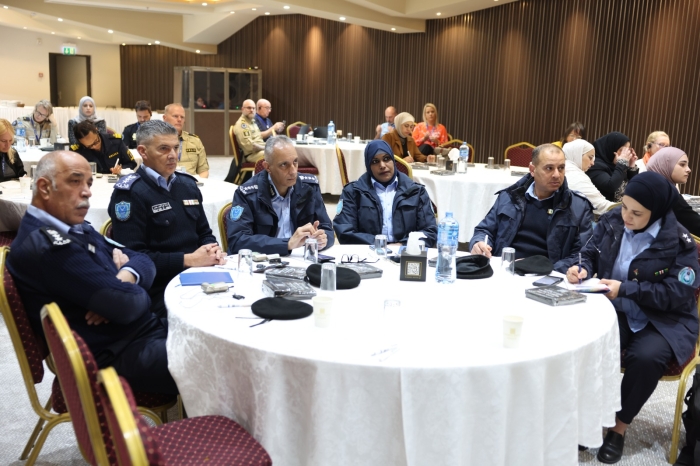
Strengthening Protection Mechanisms for women and girls in Palestine: Workshop held in Ramallah
As part of the global #16DaysOfActivism campaign, EUPOL COPPS brought together Palestinian institutions, civil society, and diplomats to reinforce the Palestinian National Referral System and improve protection pathways for women and children, in a workshop held in Ramallah on 3 December. Amid rising insecurity, displacement, and limited access to services, protection needs are greater than ever. EUPOL COPPS Head of Mission (HoM), Karin Limdal, stressed: “Protection is an obligation, not an option. Justice is a right, not a privilege.” Through real case discussions, the workshop highlighted both the strengths of Palestine’s protection system and the areas where urgent reinforcement is needed. Despite the effective coordination among partners, modern risk-assessment tools, and emergency interventions providing lifesaving support, gaps remain. Survivors still hesitate to enter shelters, follow-up is inconsistent, economic empowerment pathways remain limited, and many institutions lack trained protection guides to manage complex Gender Based Violence (GBV) cases. In her remarks, Mrs. Karin Limdal, underscored that EUPOL COPPS’ mandate, focusing on rule of law, policing, and justice reform, sits at the heart of an effective, rights-based and survivor-centered protection system. EUPOL COPPS’ HoM reaffirmed the Mission’s commitment to strengthening the Palestinian Civil Police’s capacity for safe reporting, confidentiality, and professional GBV investigations; reinforcing police-prosecution coordination; revitalising the National Referral System; advancing gender-responsive policing and advocating for sustainable, predictable funding so services remain accessible and survivors can obtain justice. These priorities form the backbone of a stronger, more accountable protection framework, one that upholds dignity, safety, and rights for women and children across Palestine.

Palestinian Judicial Institute launches EU-backed Diploma to train judges and prosecutors
To prepare a new generation of judges and prosecutors, the Palestinian Judicial Institute (PJI), supported by the EU-funded Irtiqa’ initiative and EUPOL COPPS, officially launched a two-year Judicial Studies Diploma Programme on 27 November, in Ramallah. Taught by experienced professors, judges, and prosecutors, the Diploma Programme offers rigorous academic and practical preparation, intensive legal education, and professional training, focusing on professionalism and ethics in the justice sector. The event, attended by the Palestinian Chief Justice, the Attorney General, The Office of the European Union Representative and EUPOL COPPS Advisers, was marked also an opportunity to showcase the programme’s goals and highlight the long-standing partnership between the PJI and EUPOL COPPS in supporting the development of Palestine’s judiciary.
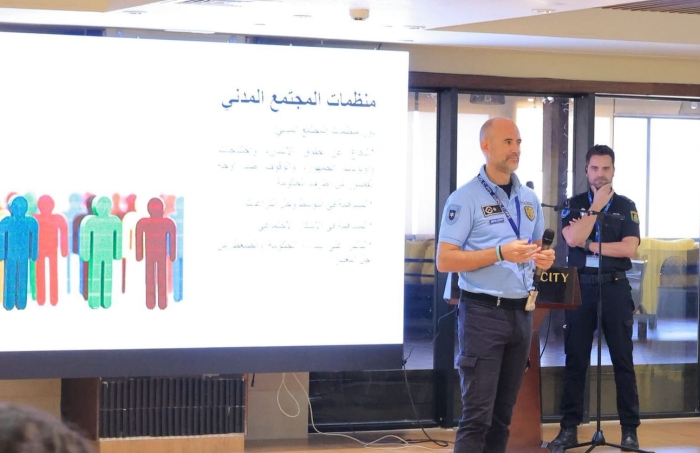
Boosting community ties to combat crime
In an effort to boost community ties and enhance the reduction of criminal activities, the Palestinian Civil Police (PCP) and EUPOL COPPS hosted a two-day workshop titled "Society is Key" on 24-25 November in Nablus. The workshop supports the PCP endeavour in establishing Community Councils in West Bank governorates to facilitate long-term cooperation between police and the public. Realistic strategies to engage with citizens, increase confidence, and encourage active public participation in crime prevention and investigation activities were discussed. EUPOL COPPS advisers emphasised the importance of effective partnerships and cooperation between police and local communities to achieve safety in neighbourhoods. The Mission’s advisers also stressed about the role of Civil Society Organizations (CSOs) and other community representatives in driving this process forward. All participants agreed that dialogue among civil society and security institutions is indispensable for generating confidence, mutual knowledge, and long-term cooperation. The workshop marks the constant effort by the PCP and EUPOL COPPS to promote community-police relations and public safety in the West Bank.
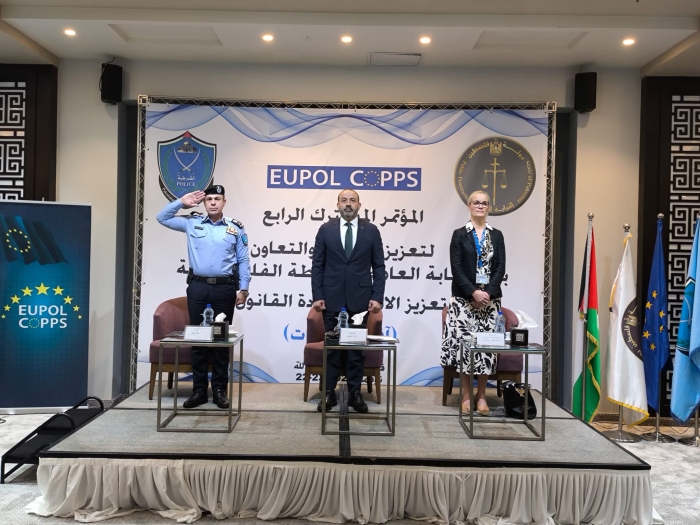
EUPOL COPPS supports Palestinian Police and Prosecution strengthen partnership
Cooperation between prosecution and police is essential for legally sound investigations and key for the effective functioning of the criminal justice chain. This is why EUPOL COPPS organised the fourth joint conference to enhance cooperation between Palestinian prosecution and police on 22-23 November, in Ramallah. The event was opened by EUPOL COPPS Head of Mission, Karin Limdal with the Palestinian Attorney General Akram Al-Khatib, and the Chief of the Palestinian Civil Police, Major General Allam Al-Saqqa. Ms. Limdal stressed about the importance of strengthening coordination and cooperation among Palestinian police, prosecution, and the wider justice chain working as one system that delivers reliable services to Palestinian citizens. Topics discussed at the conference included the role of the International Criminal Police Organisation (INTERPOL) in cross-border investigations, prospects and challenges in collecting evidence in drug related crimes, the role of the department of evidence and forensic laboratories in improving investigations, the importance of cooperation on Cybercrime and the one of media in raising community awareness and its impact on the course of the investigation. On the occasion the Attorney General and Chief of Police signed an amended Memorandum of Understanding (MoU)on strengthening mechanism for cooperation in the criminal justice field. This revised MoU reflects a renewed commitment to strengthening cooperation, streamlining communication, and ensuring better coordination across all stages of criminal investigations and prosecutions.
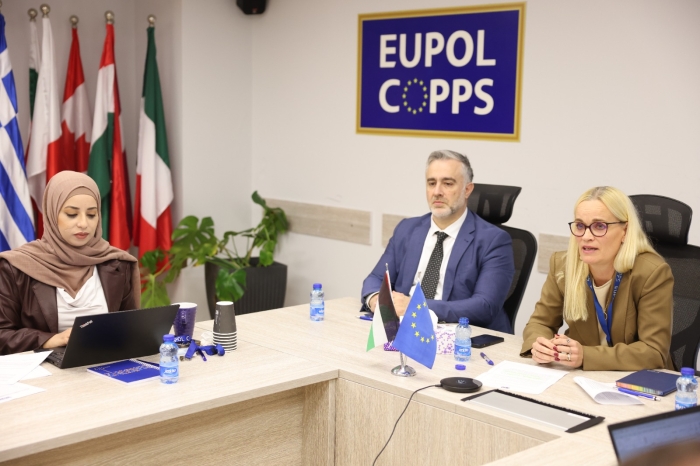
Men and boys contribution to peacebuilding: EUPOL COPPS celebrates International Men's
The Palestinian youth (18-29 years.) amount to 1.2 million in Palestine, out of which half are young men, making them a fundamental pillar in any future development or national crisis response. This and more were discussed at a roundtable titled “Supporting Men and Boys. Building Safer, Stronger Communities”, marking International Men’s Day 2025, at EUPOL COPPS headquarters, on 19 November, in Ramallah. The event addressed the importance of men and boys contributing to peacebuilding in Palestine and beyond, discussing topics including boys’ and men’s role in peace, security and justice, Community Policing as a trust-building tool and reframing youth engagement as a source of resilience rather than risk. The meeting brought together Palestinian representatives of Civil Society Organisations including “Reform” and “Sharek”, senior police officers from Community Policing and Media Administration and EUPOL COPPS staff members joined the discussions. The attendees talked about the importance of preventing violence and building trust by creating real connections between young people, local communities, and the law enforcement side. Asked about how young men in Palestine can play a more active role in advancing peace, security and justice through their engagement with the police and justice sector, a representative of the Palestinian Civil Police detailed on outreach and training at local community councils’ level, awareness campaigns for youth in schools and universities, including-on anti-narcotic and cyber crime. This is done mainly though social media. EUPOL COPPS’s Head of Mission, Karin Limdal, who opened the roundtable, asked some of the Mission’s staff to share their experience on how to tackle situations polarizing youth in their home countries. Examples from Spain were shared, highlighting situations influenced by unemployment, cybercrime and narcotics, and how the Spanish police engage in schools and universities. Another example from France focused on the issue of domestic violence. A rampant youth unemployment in the West Bank affects 38% of young men. Considering economic vulnerabilities, political instability and insecurity, discussing how can youth engagement help shift a polarized dynamic of mistrust to collaboration and shared responsibility between the State and its communities seemed of relevance on International Men’s Day. EUPOL COPPS is committed to support Palestinian people in the framework of the EU engagement for a two-state solution.
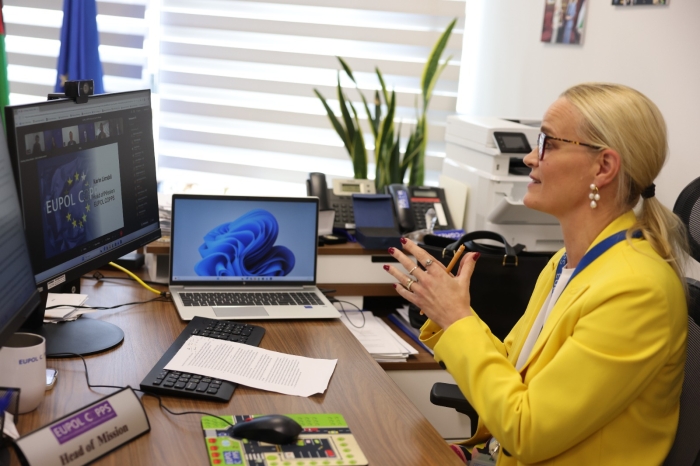
Working at EUPOL COPPS: What you need to know
As a civilian CSDP Mission, EUPOL COPPS’ primary role is to assist the Palestinian Authority in building its institutions for a future Palestinian state, focusing specifically on security and justice sector reforms. Ultimately the Mission’s objective is to improve the safety and security of the Palestinian people. By way of practical follow-up to the event, below you can find transparent and detailed answers to the most common questions about joining EUPOL COPPS in the field. The application process EUPOL COPPS relies on two main types of international staff, each with a distinct employment structure: Staff Type Contractual Relationship Remuneration Package Seconded Mission Member Contractual relation with their home government (sending institution). Assigned to the Mission for a specified period. Often retains their home government's salary and benefits. The Mission is unable to provide information on this package. Contracted Mission Member Contractual relation directly with EUPOL COPPS. Contracts are usually limited to the Mission’s mandate period. Receives a remuneration package directly from the Mission. To be seconded, individuals typically apply through their seconding authorities. A general recommendation for gaining information is to contact the Ministry of Foreign Affairs of your home country. You can learn more about the application process for a seconded position here. For an overview of recruitment and secondment process in EU Member States, visit this interactive map. EUPOL COPPS primarily recruits from EU Member States, but positions are also open to Third Contributing Countries (TCCs): Canada, Norway, and Türkiye. Note that recruiting a contracted Mission member from a TCC requires at least one seconded Mission member from that TCC to be already working in EUPOL COPPS. Recruitment requirements and timelines Age and Retirement: An age limit exists to ensure duty of care. Applicants should be able to serve the full period of a secondment (usually one year) or a contract (up to two years) prior to reaching the normal age of retirement in their respective states of citizenship. Importantly, positions are open to retired police service members provided they meet the required qualifications and experience and are within this age limit. Experience & Qualifications (Security Sector Reform/Legal): Security Sector Reform Positions: Require a university degree or equivalent professional police/military training, plus knowledge and practical experience in Security Sector Reform. Legal Positions: Typically demand several years of professional experience in the legal field (e.g., legal practice, international law, or judicial systems). Field Experience: While not always essential, field experience is highly valued as it indicates a candidate's ability to handle the demands of a Mission setting. Assessment Process: The process usually includes a selection interview with a panel. You may also be expected to complete additional assessment assignments to test skills and suitability, such as written tests, language tests, or practical presentation tasks involving case studies or situational analysis. Duration: The overall selection process usually takes about three to four months from application to deployment. The duration can vary depending on the volume of applications and the candidate’s engagement regime (seconded or contracted). Safety and Security The reality of serving in the field means acknowledging the complex security environment. First and foremost, Mission members are responsible for their own safety, as they would be anywhere else in the world. However, your safety is paramount, and the Mission has comprehensive systems in place: Proactive Intelligence: The Security and Health Department provides regular security advisories (via email and text messages) to help Mission members avoid being in the wrong place at the wrong time. This department is constantly in touch with local institutions and other sources of information to ensure you have the best intelligence. Specific Threat Procedures: There is a very specific procedure in place at Mission levels for taking shelter and ensuring protection. Upon arrival, you will be briefed thoroughly on how to face this type of threat. Emergency Planning: For extreme situations, EUPOL COPPS has protocols in place for emergency situations, including evacuations. Mission members are fully briefed on these protocols and provided with necessary contact information immediately upon arrival. Wellness and support on assignment The Mission recognises the mental and physical demands of working in a complex operational theatre. EUPOL COPPS provides various support services, including access to medical facilities through the Mission’s Medical Unit, counselling services, and recreational initiatives. The Mission generally offers a comprehensive health insurance scheme for its contracted staff, covering medical expenses, emergencies, dental, and vision care. Next steps EUPOL COPPS offers women a unique opportunity to contribute directly to peace, security, and justice sector reform in a challenging and rewarding environment. EUPOL COPPS seeks candidates who demonstrate a strong commitment to the Mission’s goals, ethical standards, and a willingness to work collaboratively. Attributes such as adaptability, resilience, and strong motivation are key to success. To find open roles, view the latest Calls for Contributions on the EUPOL COPPS website.
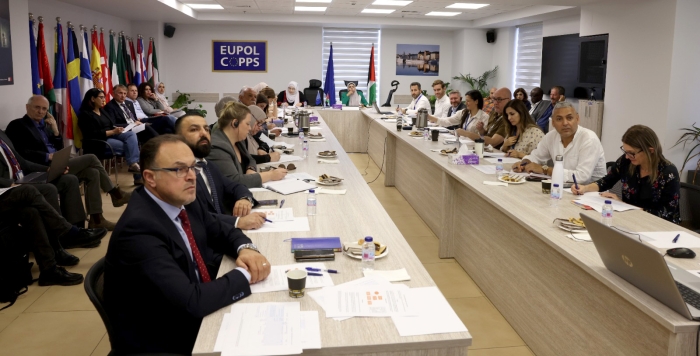
Advancing justice sector reform in Palestine
Palestinian and international stakeholders working together within the Justice Sector Working Group (JSWG) to lead strategic discussions on Palestinian justice sector reform, met at EUPOL COPPS headquarters in Ramallah on 5 November. The focus of the meeting was to enhance the activities of thematic groups, ensure effective coordination for aid and cooperation in the Justice Sector, clarify roles, responsibilities, and coordination mechanisms in an effort to strengthening Palestinian justice institutions and promoting good governance. Members participating in the JSWG include representatives from Palestinian government institutions, human rights organisations, UN agencies and EUPOL COPPS, which provides technical advice and expertise. Donor countries to the JSWG include Canada, the European Union, Spain, the United States, and the United Kingdom.
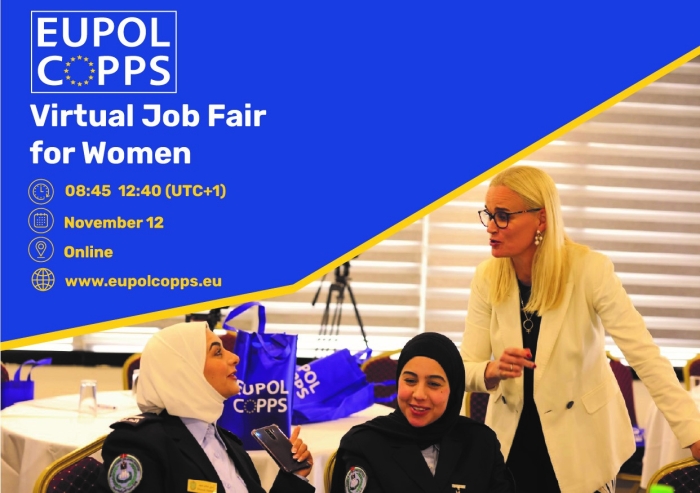
EUPOL COPPS' Virtual Job Fair: Career Opportunities for Women in Peace & Security
The fair is open to women with different professional profiles, interested in working in a civilian CSDP mission and in the fields of the rule of law, security, and peace building. During the virtual fair, there will be a direct exchange with EUPOL COPPS Mission members. Registered participants will have the opportunity to learn more about working conditions and daily mission life, application and selection process, and job possibilities for: police advisers, justice advisers; candidates with a legal or political background; candidates with an administrative, reporting or communication background; candidates with a finance, logistics, transport, IT or medical background; candidates with a public safety or security background. Register here by 11 November, 12:00 (CET) : https://lnkd.in/d7y77Y9g
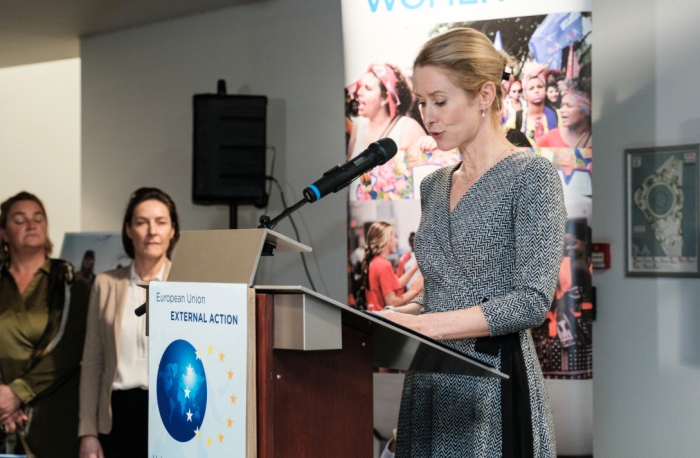
Remarks by HR/VP Kaja Kallas to open the exhibition "Celebrating 25 Years of Women, Peace and Security" with UN Women
Dear Excellencies, Dear Colleagues, Dear friends, Welcome to the External Action Service. Thank you for joining us this afternoon for the opening of one of our exhibitions in the building, one that is dedicated to women as drivers for peace. And the second once is dedicated to transitional justice in Afghanistan, which you can also visit. On the one we are now inaugurating, I would like to say a few words. For far too long, women were seen only as victims of conflict, as survivors of gender-based violence, mutilation, torture, humiliation; as casualties of decisions and actions taken by others. But 25 years ago, things started changing. 25 years ago, United Nations Security Council Resolution 1325 [thirteen twenty-five] laid the foundation for the Women, Peace and Security Agenda. And across the world today, from the villages rebuilding after war to negotiation rooms in major capital cities, there is one thing we know for sure: there is no security, no lasting peace without women as active participants in the process. The photos of this exhibition show us what this looks like. Each image captures a moment that is statistically more likely to lead to a positive outcome than if men alone are in their place. The facts are very clear: When there are more women involved in reconstruction, aid is more efficiently used and GDP growth is higher; When women are part of peacekeeping missions, they build trust faster with local communities and gather better intelligence; When women are involved in peace agreements, they are 35% more likely to last longer. It is simply common sense for women to be present at every stage of peace and security efforts. That is why today I am pleased to announce an additional 12 million euros for civil society organisations operating, amongst others, in the Middle East and the Great Lakes Region. The EU funding will strengthen and support women’s organisations in conflict, including to protect women human rights defenders. But it is also not enough for women to be simply there, they must also lead. When women lead, the conversation changes. Talk moves from ending conflict to what the future looks like and the true meaning of security, which is justice, education, dignity. But here the gender gap is far too great. In the EU’s own work, women make up a third of our Heads of civilian missions and only 11% of management positions for our military missions and operations. We have to do far better than that. EU Member States need to be putting forward more female candidates. Because if I don’t have female candidates, I can’t choose a female to lead these operations. So please can you put good candidates [forward]. I know there are a lot of good women in your Member States as well. Dear colleagues, We must keep working towards a balance, where women are not just seen as victims but as fundamental enablers for a solution. Because if women are not there in prevention, in response, in reconstruction, and if women are not leading the work, we have to ask if the objective really peace? I want the European Union to help women rise and take security and peace in their hands. And there is no better partner to do this with than UN WOMEN. Thank you for being here with us today, all of you. We do this not only because it is right, but because it works. Thank you.
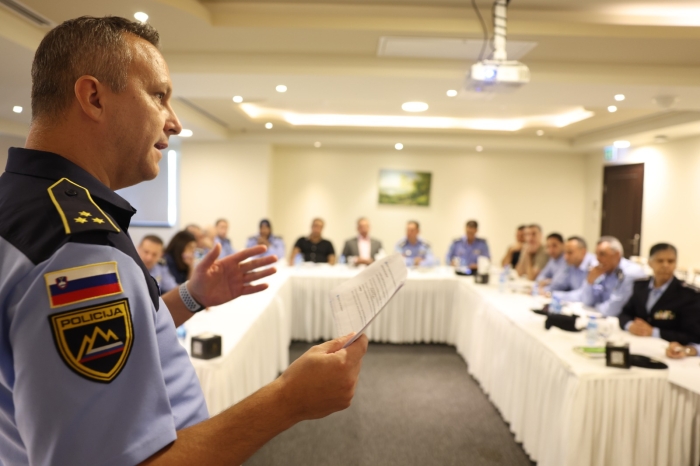
Reinforcing the investigative capacity of Palestinian Police on Criminal Investigation
To reinforce the investigative capacity of the Palestinian Civil Police (PCP) in the field of Criminal Investigation Department (CID), EUPOL COPPS and the PCP held a specialised CID training launch workshop to discuss the way forward for a newly developed Investigation Training Programme, on 5 November, in Ramallah. This workshop focused on reviewing the status of the specialised Palestinian Police Investigation training project and finalise planning process for its implementation. This programme will involve all the PCP investigators in different PCP specialised administrations. The activity was attended by and 14 PCP officers, including representatives from CID, Anti-Narcotics, Forensic Laboratory, Family and Juvenile Protection Department, and Training Administration, in addition to the Chief of Police Assistant on CID and Chief of Police Assistant on Planning and Training The discussions included an agreed timeline, delivery modalities for the training, and key responsibilities for both PCP trainers and EUPOL COPPS advisers involved. EUPOL COPPS and PCP CID advisers agree that strong investigative teams ultimately contribute to the prevention of miscarriage of justice.


